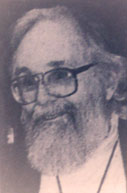

![]() David James Knight
David James Knight
Professor, novelist, poet, husband, father.
Born Aug. 18, 1926, in Toronto.
Died Feb. 3, 2001, in Toronto, of a heart attack, aged 74.
In July 1965, a professor of English literature left his position at the University of Toronto for a year's exchange in Nigeria. It was to be an eventful trip. Accompanied by his wife and three young sons, David Knight arrived in Ibadan just months before a military coup disrupted life in that city and temporarily shut down the University.
Because of the hermetic nature of the University compound, most foreigners remained. In any case, Knight was too fascinated to flee. With a boundless curiosity that was his lifelong trademark, he stayed, keeping his family with him, and recorded his impressions. On his return to Canada, these experiences led to a novel that was short-listed for a 1972 Governor General's Award. Farquharson's Physique: and What it Did to his Mind (Hodder & Stoughton; Stein and Day) juxtaposed Nigeria's political tensions with the erratic personal life of the book's protagonist, a visiting Canadian academic whose outlook is gradually transformed by the country's growing turmoil.
Knight's skills as a writer were fostered early in childhood B at a high emotional cost, given the ambitions placed on his youthful shoulders. His father was a power-plant engineer, and his mother an accomplished amateur pianist, playwright and short story writer, who was well-known in Toronto's small artistic world of the 20s and 30s. A close neighbour helped steer Knight to Victoria College in the University of Toronto, where his undergraduate years were spent in the celebrated English Language and Literature program. He went on to complete a doctorate at Yale, with a thesis on Langland's Piers Ploughman , then returned to Vic as a professor, where he remained for the next three decades.
In the star-studded English Department at Vic, Knight stood out with a stubbornly original approach to teaching that made him a memorable and beloved figure to generations of students. Most notably, he founded a creative writing course, whose curriculum included the study of literary forms, especially in poetry, so that today there are numerous U. of T. alumni who can recall the intricacies of a sestina, palindrome, haiku, and villanelle, as well as the unforgettable delights of terza rima.
Knight's later books, which included poetry as well as an extensive series of science fiction novels, never achieved the success of Farquharson's Physique. But professional disappointments didn't detract from his uncommon ability to live life to the full, and to keep writing. He and his wife, a collage-artist called by her first initials ML, had an unusually close and happy marriage, while raising their sons -- Ben, Piers, and Henry -- on Sussex Avenue, at the western edge of the U. of T.'s downtown campus, in an 1880s house filled to overflowing with an eclectic assortment of books, artwork and mementos.
Knight's retirement years were particularly happy. He devoted himself to a succession of writing projects, and led what must be one of the longest-running writers groups in Canada B the weekly Thursday Group -- originally started in 1980 as an offshoot of his creative writing course. He also owned a small press, Childe Thursday, while finding time to indulge his passions for cooking, china- and glass-collecting, and travel.
In later years, Venice became his spiritual home, and he and his wife visited it often. Knight was captivated by the city's luminous air, stone squares, and ever-present past, his fascination informed by a knowledge of Venice's geography and history that few other visitors could match. He would be pleased to know that his family and numerous friends now often think of him in this most magical of settings B a contented figure basking in the evanescent clear light of St. Mark's Square.
Mark Lovewell teaches Economics at Ryerson. He was a Thursday Group member and friend of David Knight.